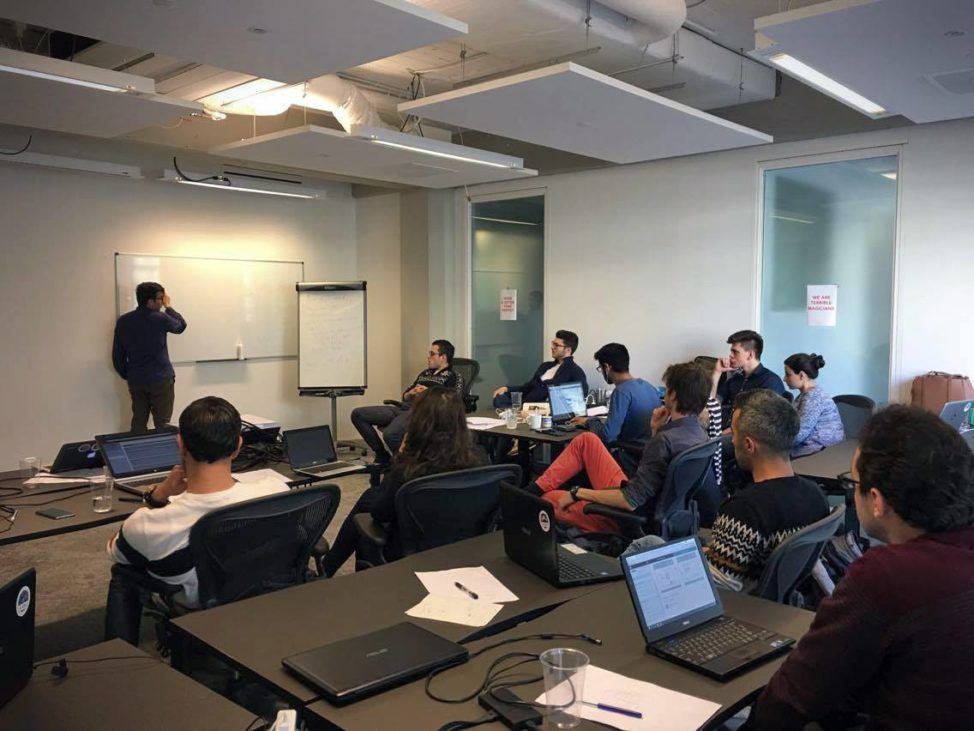Technology is finding ways to bridge cultural gaps and help refugees from the Middle East and North Africa assimilate in Europe while giving back to their host countries.
When millions of refugees began to wash ashore in Europe in 2015, so did myriads of challenges – meeting basic needs, education, healthcare, jobs, safety, and mitigating cultural divides. But it’s a two-sided coin. And recognizing this, some of Europe’s innovators found ways to harness the potential of young, skilled immigrants to solve some of the old continent’s problems.
In some cases, those innovators were the refugees themselves.
Take for instance MigrantHire, a website co-founded by Hussein Shaker, a Syrian refugee who arrived in Germany in 2015 with more than a million others like him. Eighty percent of them were under the age of 35, many with much-needed skills. Shaker helped start MigrantHire to connect them with potential employers in the tech sector looking for new talent.
Like Shaker, Teodor Cataniciu, founder and chairman of the Dutch nonprofit, Restart Network, recognized both the opportunity and the need. There were plenty of apps and websites to help refugees with accommodations, local languages, cultures and customs, but to find jobs, they needed training, particularly in countries with older populations like the Netherlands and Germany, where hundreds of thousands of IT positions remain unfulfilled.
The IT skills gap problem is global. But Europe alone is expected to face a shortage of 900,000 IT specialists by 2020, according to Restart.
To improve the refugees’ chances of landing some of these jobs, Restart has partnered with tech players like IBM and Facebook to host coding bootcamps on its campus in Rotterdam.
“We saw … millions of refugees arriving on our continent who want to start again and thought we could create something that is part of the solution,” said Cataniciu in an email. “Our school is surrounded by more than 100 tech companies, and we work closely with industry leaders and experts to really create a different type of school.”
Cataniciu said he believes good education should be available to anyone with “grit and passion,” and that money “shouldn’t be the currency dictating someone’s future opportunities.”
The three-month classes are the world’s first crowdfunded bootcamps. The students, fluent in English, learn Dutch and become junior developers, with a potential for landing jobs in the Netherlands.
*The school has already graduated 100 refugees. And according to Restart, 90 percent of its graduates already have jobs or are continuing their education.
There’s an app for that
Earlier in the migrant crisis, Germany and Austria, both overwhelmed by an influx of refugees, released a mobile app to educate immigrant children and speed up their assimilation. The app, called “hallo App Deutsch,” uses words, sounds, and pictures to teach kids who can’t read roman script.
Other apps include Refugermany, which provides information about asylum procedures, housing, culture, jobs and education, and Denmark’s ligeret.nu, or Equality for All, available in Danish, English, Arabic, Farsi, Urdu and Turkish.
The Danish government launched the app to help address some of the key challenges countries like Germany and Denmark face as they receive more migrants, particularly with regard to gender equality, sexuality, sexual harassment and assault- themes that ligeret.nu tries to address.
The app’s website cites statistics from Denmark’s Ministry of Justice showing that 43.5 percent of all people convicted of rape between 2013 and 2014 were immigrants or their decedents.
While ligeret.nu includes resources about citizenship, jobs and various aspects of Danish life, it is focused on bridging cultural gaps with information about gender equality, sexuality, and individual rights and responsibilities.
*Editor’s note:
Teodor Cataniciu has added the following correction: “The correct numbers are 40 started, 25 graduated in 2 classes so far. With the next class of 25 people these numbers will increase a bit but still not be at 100 until the end of the year. “

